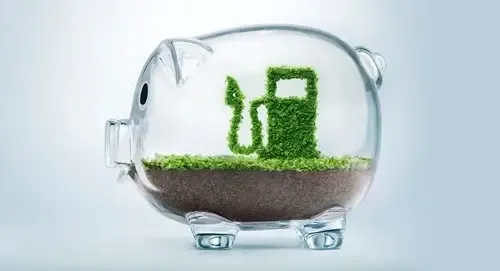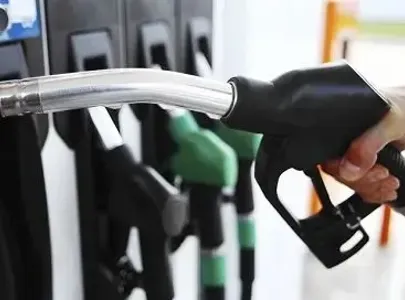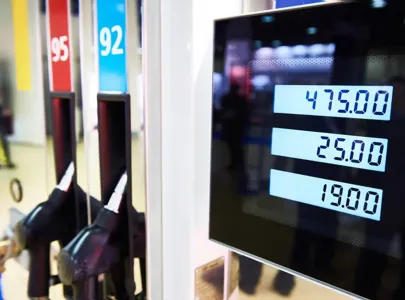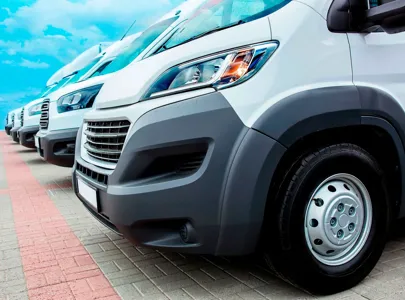In this section of the guide we take a look at expenses and managing business fuel.
Find out our recommendations to help you improve the way your business manages employee expenses and also how you can minimise business fuel costs.
We cover expenses in small businesses and how larger organisations can save on travel costs by making considerations such purchasing energy efficient vehicles and encouraging energy efficient driving practices.

Managing vehicle depreciation for lower overall costs
Discover how managing fleet vehicle depreciation can lower overall costs through better maintenance and a fuel card for companies.

How to cut idle time and reduce fuel consumption
Discover how to reduce idle time to prevent fuel waste and cut costs effectively. Explore our blog for valuable insights.

Selecting cost-effective suppliers for routine fleet maintenance
Need help selecting cost-effective suppliers for routine fleet maintenance? Our blog offers insights and tips for making the right choice.

Best Fleet Fuel Cards Small Business
Find the perfect fleet fuel cards small business solution. Streamline your fuel expenses with our recommended cards for small businesses.

Reducing idle time to prevent fuel wastage
Discover the benefits of using a diesel fuel card to lower expenses. Find tips on reducing idle time and preventing fuel waste.

Modernising the intergenerational family business
Family businesses form the backbone of the UK’s economy, accounting for a significant portion of employment and GDP. These enterprises often carry a rich heritage, built on the dedication and hard work of successive generations.
Rural entrepreneurship in the UK: overcoming logistical challenges
The UK’s rural areas, with sweeping landscapes and tight-knit communities, present unique opportunities for fledgling businesses.
The Green SME: Balancing Profitability and Sustainability
Adopting green habits is no longer a nice to have. It's essential… because your customers think the same. More importantly, it's a compelling proposition for the businesses we run and work for to want to help protect our environment for our sake and our children's sake.
Hidden Costs for UK SMEs: A Deep Dive into making quick wins
Hidden costs are a cashflow killer for small and medium-sized enterprises in the UK, squeezing their cash flow and stifling growth to leave them treading water in an increasingly competitive marketplace.
How To Reduce Travel Costs In A Business
Travel can be a very significant cost to businesses and organisations. Vehicles, whether hired or purchased outright, almost always represent significant financial outlay. Then there are the costs associated with running and maintaining those vehicles, including tax, insurance and fuel.

How To Save Money on Business Fuel
Saving money on business fuel can essentially be broken down into the following: how you use your fuel and where you get it from. In this article we share useful tips on how to save money on both fronts.

How to manage small business expenses?
Small business expenses can be costly and time consuming to administer if they are not managed correctly. To make things easier there are a few strategies you can employ within your business, including getting a business fuel card.

Small Business Cost Saving Tips
Saving money on unnecessary expenses is crucial for small businesses to maximise profit and manage cash flow effectively. We’ve put together a list of tips to help small businesses save money.

Increasing fleet efficiency
Managing a fleet of vehicles can be challenging, fleet efficiency is a key metric that helps fleet managers to identify any issues and use this information to improve performance. In this article we take a look at what fleet efficiency means and how it can be broken down into categories. We also look at tips on managing and improving each aspect of fleet efficiency.

How to Reduce Your Fleet Fuel Costs
Whether your fleet is made up of cars, vans, or agricultural vehicles, you want to make sure it's running as efficiently and cost-effectively as possible. Though fuel cards can help you reduce your business fuel costs, there are other ways you can try to keep your petrol and diesel spending down. This article will give you some advice on how to proactively reduce your fleet fuel costs.

Business fuel cards with no fees
Any opportunity that allows you to cut costs or have more control helps the company – especially in today’s competitive market and cost of living crisis. Fuel cards with no fees are a great place to start. Find out why you should try one and how to apply.

How to track employee fuel usage
Tracking your employees' fuel usage is the easiest and quickest way to reduce fuel costs and expenses. Monitoring who is spending what, where and when leads to better management of how your team fill up – and allows your fleet managers to bring in cost-saving measures.

How to save on fuel costs for my business
Whether you're a small business owner with a fleet of vehicles or a team of salespeople in company cars, one of the biggest daily outlays is always going to be fuel for business purposes. All companies – from SMEs to sole traders – know only too well the pain that goes with constantly filling up at the forecourt to make sure their delivery and transport arms run smoothly.

Budgeting for rising fuel costs (controlling costs)
Fluctuating fuel prices is something the whole world is dealing with right now. And when it comes to businesses and their budgets, it’s one of the biggest considerations, especially for those in the transportation industry.

Essential lessons in fuel management for SMEs
Does your business rely on travel? If so, fuel management is key to running a successful operation. It involves focusing on ways to improve fuel use, lower costs as well as reducing harm to the environment.

The Role of Artificial Intelligence in Predictive Fuel Management
As fuel prices continue to fluctuate and environmental concerns around fuel consumption rise, businesses across various industries are looking for more efficient ways to manage fuel usage.

Optimising Fuel Management for SMEs in the Gig Economy
Master fuel management for SMEs with freelance drivers. Get essential tips on optimising efficiency and cost-effectiveness.

Autumn Budget '24: How small businesses are affected
Fleet managers and finance teams will have spent hours poring over the new government's first budget and the tax implications it could have on their business’ fuel outgoings and expenses.

The rise of the 'micro-multinational' business
Today, we live in an interconnected world. That means the barriers to entering international markets are lower than ever before. Thanks to advancements in technology, logistics and communication, even small enterprises can operate globally.